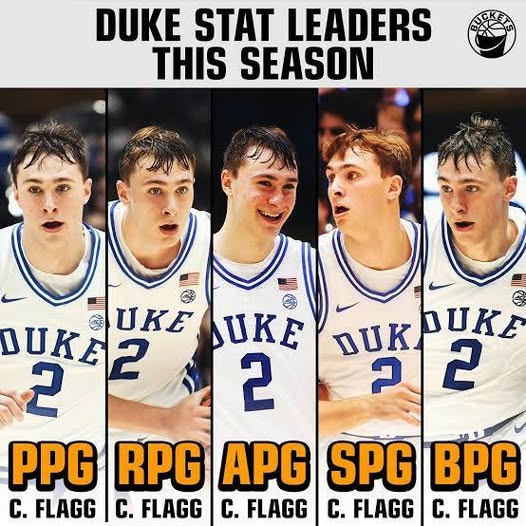When Cooper Flagg committed to Duke University, the hype was palpable. A consensus No. 1 recruit, the Maine native entered the 2024-25 season carrying the weight of lofty expectations and an entire fanbase eager to witness the arrival of a generational talent. What followed was a campaign that transcended anticipation, shattered statistical norms, and redefined what it means to be a one-and-done phenom.
This week, the Atlantic Coast Conference highlighted another accolade to Flagg’s already remarkable résumé: he is the first player in Duke history to lead the team in points, rebounds, assists, steals, and blocks in a single season. In doing so, Flagg carved his name into the annals of Blue Devil lore—alongside names like Christian Laettner, Grant Hill, Shane Battier, and Zion Williamson—and arguably leapfrogged them all in terms of sheer all-around impact during a freshman year.
This unprecedented feat isn’t just a reflection of statistical dominance. It’s an embodiment of versatility, leadership, and a complete understanding of the game that goes beyond box scores. Let’s dive into the gravity of Flagg’s season and what it means for Duke, the ACC, and college basketball as a whole.
Rewriting the Record Books
At the conclusion of Duke’s season, Cooper Flagg led the Blue Devils with averages of 19.7 points, 8.9 rebounds, 5.1 assists, 2.3 steals, and 2.5 blocks per game. Those numbers, on their own, would be staggering for any player, much less a freshman navigating the gauntlet of ACC play.
And yet, what makes Flagg’s statistical profile so astonishing is that he wasn’t simply the team’s go-to scorer—he was its floor general, rim protector, rebounding machine, and defensive anchor all at once.
The list of college players—freshmen or otherwise—who have accomplished such a feat across all five major categories is incredibly short. Among high-major programs, it’s practically unheard of. Duke, with its legendary basketball pedigree, had never seen it before. Not from Laettner. Not from Elton Brand. Not from Jayson Tatum. Not even from Zion.
For a program often associated with specialists—elite guards, dominant post players, or transcendent scorers—Flagg’s all-encompassing dominance signals a shift in what it means to be “the face of Duke.”
Basketball IQ Beyond His Years
What separates Flagg from other elite talents isn’t just his athleticism or size—it’s how he sees the game.
On offense, Flagg’s ability to initiate plays as a 6’9” forward often gave Duke a positional mismatch against virtually every team it faced. His vision allowed Duke to run offense through him at the high post, where he could distribute to shooters or use his length to get to the rim.
In several critical moments—most notably during Duke’s thrilling overtime win against North Carolina—Flagg took over the game not with isolation scoring, but with timely assists, clutch rebounds, and a blocked shot in the final seconds that sealed the victory.
“That’s not something you teach,” Duke head coach Jon Scheyer said. “He just gets it. Every possession, every rotation, every read—he’s a step ahead. And what’s crazy is he’s only 18 years old.”
His reads weren’t just offensive, either. Flagg often guarded positions 1 through 5, switching seamlessly from wings to centers and disrupting passing lanes with his 7’1” wingspan. He frequently ended up with the ball in his hands to start the break after making a defensive stop, accelerating Duke’s tempo and forcing opponents to scramble.
ACC Accolades and National Recognition
While the ACC’s recognition of Flagg’s statistical sweep is historic, it’s just one of many honors he’s racked up this season.
- ACC Freshman of the Year: Unanimously selected.
- First-Team All-ACC: A no-brainer, as he was Duke’s engine on both ends of the floor.
- ACC Defensive Player of the Year: A testament to his 2.3 steals and 2.5 blocks per game.
- Naismith Trophy Finalist: Becoming just the second freshman in Duke history to be a finalist alongside Zion.
With all these accolades, it’s easy to forget Flagg was often double-teamed, game-planned against, and asked to carry Duke during a year marked by inconsistency elsewhere on the roster. But he rose above it all—not with flash, but with poise, grit, and a relentless drive.
“He’s as complete a freshman as I’ve ever seen,” said former Duke great and ESPN analyst Jay Williams. “He controls the game on both ends, but the scary part is how unselfish he is. He’s just wired to win.”
Defining Moments of the Season
Flagg had several games that defined his freshman campaign, each showing a different facet of his brilliance:
Duke vs. Michigan State (Champions Classic)
In one of the first marquee matchups of the season, Flagg announced himself to a national audience with a 26-point, 12-rebound, 6-assist, 3-steal, 3-block masterpiece. Facing veteran competition, he played like the most mature player on the court.
Duke vs. North Carolina (March 2, 2025)
With Duke clinging to a late-season Top-10 ranking, Flagg posted 21 points, 10 rebounds, 7 assists, 3 steals, and the game-saving block on RJ Davis in the closing seconds. It was a performance that etched his name in rivalry lore.
ACC Tournament Semifinal vs. Virginia
Flagg flirted with a triple-double—19 points, 11 rebounds, and 9 assists—while also recording 4 blocks. His dominance dictated every aspect of the game and sent Duke to the final.
Legacy Among Duke Greats
Anytime a player dons the Duke blue, comparisons to legends of the past are inevitable. In Flagg’s case, those comparisons were already surfacing before he played a college minute.
Now, with a season that can only be described as historic, Flagg isn’t just mentioned in the same breath as Duke icons—he may have outshined them.
- Christian Laettner was a clutch postseason player, but didn’t dominate all five statistical categories.
- Grant Hill had incredible versatility, but shared responsibilities on a loaded roster.
- Shane Battier was a defensive maestro, but not a primary playmaker.
- Zion Williamson was dominant and spectacular, but even he didn’t lead Duke in assists.
What makes Flagg’s campaign even more unique is that he achieved his numbers within a team system that rarely padded stats. Duke’s offensive sets emphasized ball movement, and its rotation—while youthful—wasn’t short on talent. Flagg’s leadership through all of it shined through.
NBA Scouts Are Already Sold
It’s no secret that Flagg’s time in Durham is likely one-and-done. And based on the current trajectory, he could be the No. 1 overall pick in the 2025 NBA Draft.
Scouts are enamored not just with his measurables and athleticism, but with the maturity of his game. Several NBA executives have compared his play style to that of Scottie Pippen, with the mindset of Tim Duncan and the instincts of Draymond Green.
“He plays like a 10-year NBA vet,” one scout remarked. “He’s vocal, he’s engaged, and he does whatever the team needs. That’s not just rare—it’s priceless.”
What It Means for Duke’s Future
Jon Scheyer couldn’t have asked for a better ambassador to lead Duke into the post-Krzyzewski era. While Scheyer’s first two seasons were solid, Flagg’s arrival gave Duke a defining star and a renewed identity.
Even with Flagg likely headed to the NBA, his impact on the program’s culture will linger. Future recruits saw what it looks like to be the focal point at Duke without sacrificing team basketball. They saw how defense and leadership could coexist with highlight dunks and triple-doubles.
Flagg’s presence also helped secure one of Duke’s top-ranked incoming classes for 2025-26, with several five-stars citing Flagg as a mentor during visits and off-season workouts.
The Intangible Greatness
As impressive as the stats are, it’s the intangibles that elevated Flagg to legendary status. His willingness to dive for loose balls in December games. His patience in postgame pressers. His humility when asked about individual accomplishments.
“It’s not about me,” Flagg said after learning he led the team in all five major stat categories. “I just wanted to win. That’s all I ever want to do.”
There’s an authenticity to Flagg that fans recognize and appreciate. He signed every autograph, took every photo, and represented Duke with dignity through every high and low.
Final Thoughts: A Season for the Ages
In a sport where freshman phenoms often flash brilliance but lack substance, Cooper Flagg delivered both in spades. He was a walking highlight reel, a stat-sheet stuffer, a leader, and now—officially—a history-maker.
The ACC’s recognition of his unique accomplishment adds one more jewel to the crown of what may go down as the most complete freshman season in Duke history. More than that, it cements Flagg as a player who didn’t just live up to the hype—he exceeded it.
In a few months, he’ll shake hands with the NBA commissioner as the likely No. 1 pick. But for Duke fans, Flagg’s impact will remain forever. The banner may not hang with his name, but his imprint is on every inch of Cameron Indoor Stadium.



